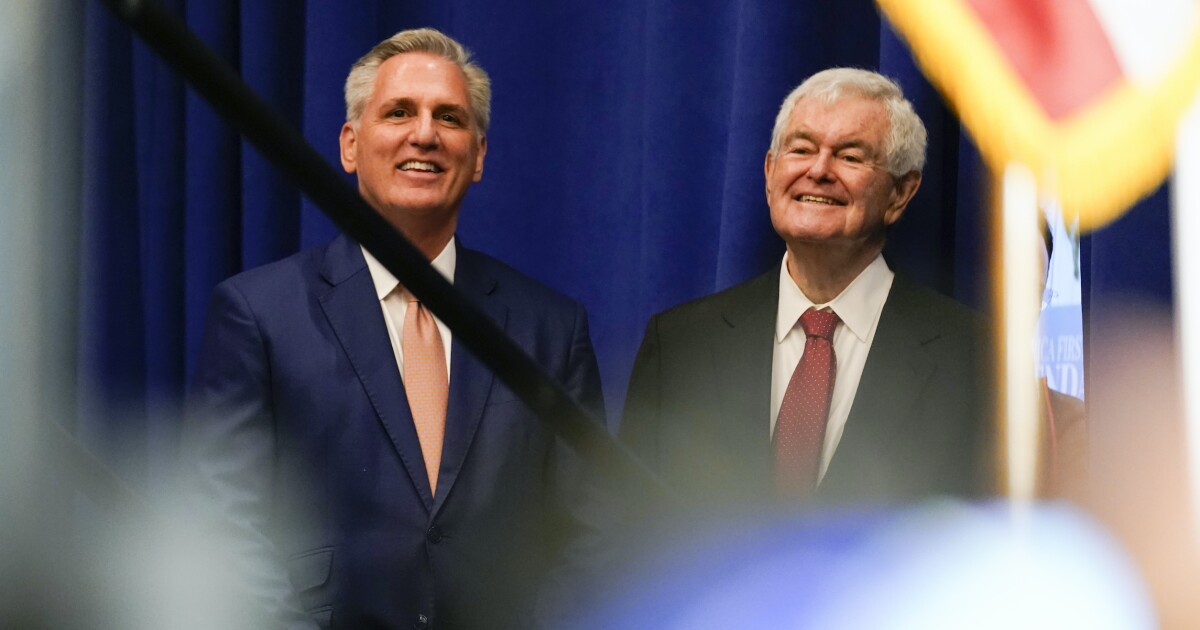

Newly elected House Speaker Kevin McCarthy (R-CA) would like to defy recent history. He’s joining a troubled fraternity whose tenures ended badly, as opposed to riding off into a triumphant semi-retirement like former House Speaker Nancy Pelosi (D-CA).
Former House Speaker Newt Gingrich (R-GA) helped lead Republicans to their first majority in the chamber in 40 years, the first member of his party to wield the gavel since Rep. Joseph W. Martin Jr (R-MA). He was out within five years, with the GOP’s right flank already nipping at his heels.
Former House Speaker John Boehner (R-OH) was actually booted from the original Gingrich leadership team, passed over after two terms as the House Republican Conference’s chairman in favor of then-Rep. J.C. Watts (R-OK). He clawed his way all the back up to the top spot, winning the speakership in 2011. Within four years, he was hounded out of office by disaffected conservatives.
RECESSION WORRIES WHITE HOUSE IN 2023
Former House Speaker Paul Ryan (R-WI) was content to be the chairman of the House Ways and Means Committee, the assignment he had long coveted. He was a reluctant speaker. All he wanted to do was play Jack Kemp to a future Republican president’s Ronald Reagan, crafting tax and budget legislation they would celebrate and sign into law.
Instead Ryan got former President Donald Trump, with whom he disagreed on key issues and had a different approach to governing. The longtime movement conservative darling, whose “Path to Prosperity” and “Roadmap for America’s Future” were blueprints to right-size the welfare state at the cost of the average postwar tax burden, ran afoul of grassroots conservatives. He left Congress rather than vie for minority leader after Democrats retook the House in the 2018 midterm election.
Gingrich and Ryan remain influential, and Boehner appears to be happy in retirement. But McCarthy likely aspired to more when he set his sights on the gavel.
Arguably, the most successful and certainly the more durable Republican House speaker of this period was Rep. Dennis Hastert (R-IL), who went to prison for unrelated reasons. And Hastert, who took the speakership during the tumultuous post-Gingrich transition that briefly saw the gavel floated to then-Rep. Bob Livingston (R-LA), presided over dramatic increases in federal spending that sowed conservative discontent and radicalized the faction that bedeviled Boehner, Ryan, and now McCarthy.
McCarthy not only becomes speaker in the context of all that daunting history, but with all of the factors that made his predecessors unsuccessful intensified. He won his position on the 15th ballot after a sustained conservative holdout.
Republicans failed to make big gains in the midterm elections amid serious divisions over how to position the party as President Joe Biden faltered. This both increased intraparty finger-pointing and reduced McCarthy’s margin for error.
The twice-impeached Trump remains on the scene, helping to pull McCarthy across the finish line and waging his third bid for the presidency. But Trump’s baggage, his fixation on the last election and other events of the past, and his listless campaign have many Republicans looking for new leadership. McCarthy was elected hours after the second anniversary of the Jan. 6 Capitol riot.
The House Freedom Caucus has made its bones as a conservative pressure group within the House Republican Conference with its willingness to derail legislation supported by leadership and even most other GOP lawmakers. This time, key Freedom Caucus members applied this tactic to the speaker’s race and won concessions that will give them more leverage over a slender majority.
In the last hours of the speakership fight, the most powerful members were arguably Reps. Matt Gaetz (R-FL) and Marjorie Taylor Greene (R-GA).
The activists of both parties have ambitious goals that are disproportionate to the power voters are willing to give them. Biden and the Democrats dealt with this for the past two years, as talk of a progressive agenda rivaling Presidents Franklin D. Roosevelt and Lyndon B. Johnson repeatedly collapsed into a razor-thin House majority and 50-50 Senate.
Republicans now face the same problem, but without the White House or the Senate. And while Republicans can’t chafe against the constitutional constraints on radical change with small congressional margins as readily as the Democrats can (though Trump has come close), some populist and nationalist conservatives are willing to contemplate pushing the boundaries of state power in ways unthinkable from Barry Goldwater to Reagan.
McCarthy could preside over the return of power to members and committees. The leadership-driven House has paradoxically worsened the anti-speaker rebellions by leaving large numbers of lawmakers with little else to do — did Greene really miss her committee assignments? — besides riling the base on television and Twitter.
CLICK HERE TO READ MORE FROM THE WASHINGTON EXAMINER
Alternatively, McCarthy’s speakership could be defined by the same chaos and infighting that delayed its beginning. This would reinforce the GOP’s image as a party of shutdowns, default, and obstruction with little appetite for governing ahead of yet another crucial election year. Or he could even be gone in a few weeks.
The 15 ballots it took for McCarthy to win may be one of his easier tasks.






